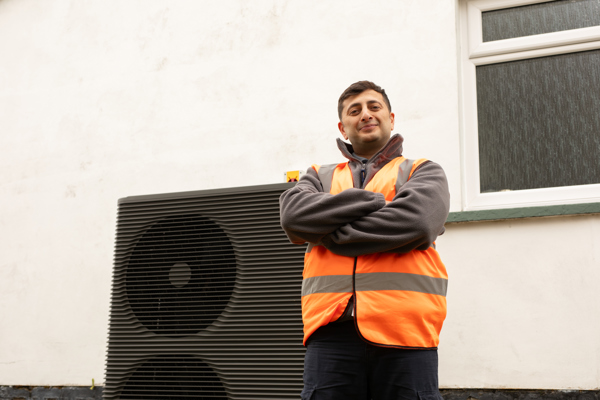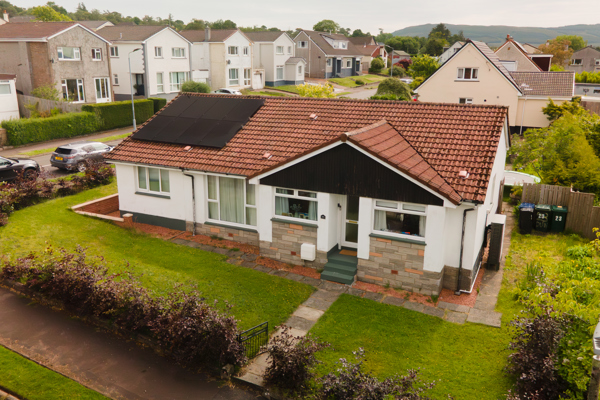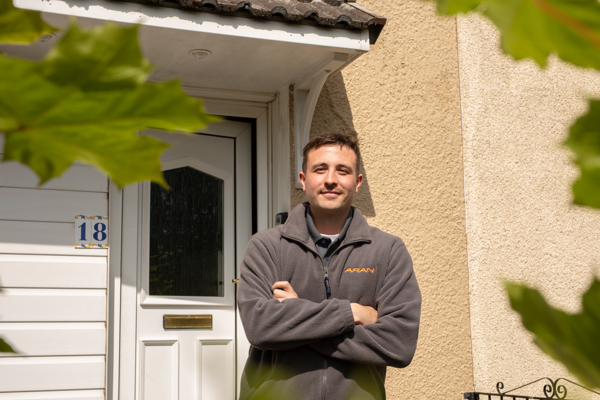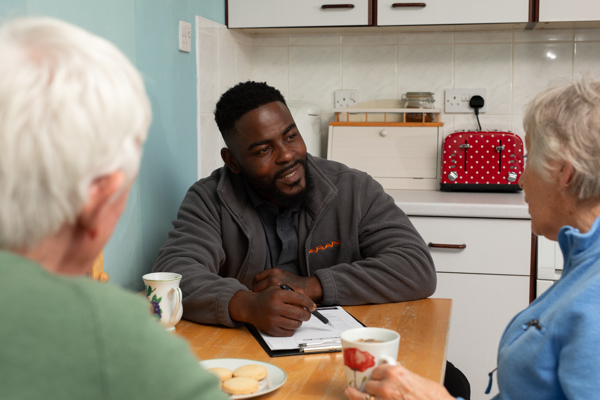Air Source Heat Pumps
Low-cost, low-carbon heating for your home.
An air source heat pump is a smart, energy-efficient way to heat your home. It pulls warmth from the air outside and uses it to heat your radiators, underfloor heating, and hot water—even when it’s cold out.
And through government-funded schemes, you could get one installed for free.
What is an air source heat pump?
An air source heat pump takes heat from the air outside your home and moves it inside. It works a bit like a fridge in reverse, using electricity to concentrate and transfer heat where you need it most.
It can power your central heating and provide hot water, replacing or working alongside a traditional boiler. It’s a greener, more modern way to keep warm.
Why choose an air source heat pump?

Cut your energy bills
Air source heat pumps are very efficient. For every unit of electricity they use, they can generate 3 to 4 units of heat.

Lower your carbon footprint
Because they don’t burn fossil fuels, air source heat pumps produce far fewer emissions than gas or oil heating.

Reliable all year round
They work even when the temperature drops below freezing, so you’ll stay warm whatever the weather.

Minimal maintenance
Once installed, they’re easy to look after—just like any modern heating system.

Long-lasting and future-ready
With a lifespan of 20+ years, air source heat pumps are built to last and support the UK’s move to low-carbon homes.
Check my eligibility
Find out if you’re eligible for free home energy efficiency improvements using our eligibility checker.
Who can get a free air source heat pump?
If you live in England or Wales, you might be able to get an air source heat pump fully funded through a government grant.
You could be eligible if:
- You’re a homeowner or private tenant
- Your home has an EPC rating of D or lower
- Your household meets one of the following:
- You receive a means-tested benefit
- You live in a qualifying postcode
- Your total income is under £36,000 before tax
- Or your income after housing costs is under £20,000, depending on household size and needs
Not sure? We can help you check, and provide a free EPC if needed.
How does the process work?
02

Home survey
We’ll arrange a visit to check if a heat pump is right for your property.
03

System design and approval
Our team creates a heating plan tailored to your home, then submits it for funding approval.
04

Installation
Once approved, we’ll schedule the installation at a time that works for you.
05

Ongoing support
We’ll show you how to use your new system and make sure you’re comfortable with everything.
Frequently Asked Questions (FAQs) about air source heat pumps
A heat pump captures heat from the air, ground, or water outside even within cold weather and uses electricity to boost it to a higher temperature. This heat is used to warm your home and hot water. As its an efficient, low-carbon way to stay warm.
It captures heat from the outside air and transfers it to a refrigerant. The refrigerant is compressed to raise its temperature, then passes through a heat exchanger to warm the water used in your heating system. This cycle repeats, efficiently providing heating and hot water using electricity.
Many homes can be installed with a heat pump, but having a good insulation is key. With well-insulated and ventilated homes with homes built for modern standards are ideal. You would need some outdoor space with good airflow for the unit. If the home is not well insulated, it could use more energy to maintain the warmth, so upgrades to insulation or radiators may be recommended.
Cost varies depending on the home’s size, insulation, and heating needs. On average, with installation and available grants, you can expect to pay £6,500 and £11,500 (according to gov.uk). With a full assessment by an installer, they can give you a tailored quote, as it is best to get at least three quotes to compare options and find the best value.
We help you access UK-wide grants to install air source heat pumps and improve home energy efficiency. Key schemes include:
- Warm Homes: Local Grant – For low-income households in poorly insulated homes.
- Connected for Warmth – Fully funded heat pump installations, insulation, and up to £1,000 in energy bill support over two years for those with health conditions.
- ECO Flex Schemes – Support for energy-saving upgrades, including heat pumps, for low-income and vulnerable households.
If eligible, everything from survey to installation is fully funded. We guide you through the entire process.
Heat pumps are highly efficient and can reduce your energy bills, if you switch to a smart electricity tariff and remove your gas meter. A typical gas-heated home could save around £234 per year. Savings depend on how efficiently the system runs, so improving insulation and upgrading radiators can help lower running costs even further.
Heat pumps use renewable energy from the air, ground, or water. As it significantly reduces harmful greenhouse gas emissions. They don’t emit carbon dioxide or nitrous oxide during operation. Which makes them much cleaner and greener to heat your home and help lower your household’s carbon footprint. As pairing a heat pump with green electricity can make your heating virtually zero-carbon.
In many cases, you do not need planning permission. Heat pumps are often considered permitted development if certain conditions are met. For air source heat pumps, the outdoor unit must be placed with enough space for airflow and meet size and location requirements. You’ll also need to consider the number of units, their placement, and whether your property is a listed building or in a conservation area, which may require special permissions.
Ground and water source heat pumps are also usually permitted development, though site-specific factors still apply.
Before starting any work, it’s important to:
- Check with your Local Authority Planning Department to confirm local rules.
- Notify your District Network Operator (DNO), as they manage your electricity connection.
- Ensure your installer is MCS certified, as this is often required for compliance and grant eligibility.
We provide most of the support and advice around this, helping you understand the requirements and guiding you through the process to ensure everything is in place for a smooth installation.
To get the best performance from a heat pump, your home should be well insulated to reduce heat loss. Focus on improving insulation in the roof, walls, and floors, and upgrade windows, doors, and ventilation where needed. Sealing drafts and improving airtightness also help. A home energy assessment can identify the most effective upgrades to make your home heat pump–ready and energy efficient.
Heat pumps do produce some sound, usually a gentle hum from the outdoor fan unit. Most people find the noise level to be low and not disruptive especially with modern, well-installed systems.
To minimise any potential disturbance:
- Avoid placing the unit near bedroom windows or close to neighbouring properties.
- A qualified installer will carry out a noise assessment before installation.
- Regular servicing helps keep the system running quietly and efficiently.
Ground and water source heat pumps are typically even quieter, as they’re installed indoors in insulated casings.
Take advantage of free government funding today
Find out if you’re eligible for free home energy efficiency improvements using our eligibility checker.

